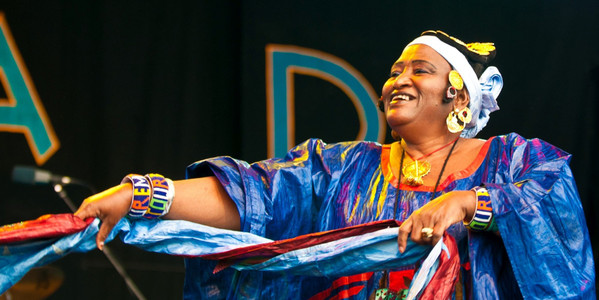


NEWS:
Only a few days left to hear our September stream - otherwise go to MixCloud to listen without detailed artist/gig info
Artist Info
|
Khaira Arby  Image from Discogs  Khaïra Arby (Timbuktu, Mali, September 21, 1959 - August 19, 2018) was a Malian singer. Khaïra Arby (Timbuktu, Mali, September 21, 1959 - August 19, 2018) was a Malian singer.Khaïra Arby, "The Nightingale of the North", from the desert from Agouni, north of Timbuktu, Mali, and cousin to Ali Farka Touré sings in Songhai, Arabic, Tamashek and Bambara. She was born on September 21, 1959, in the Abaradjou neighborhood of Tomboctou, to a Berabiche father and a Tamachek mother. The only singer in her family, Khaira started to perform, in 1970, when she was only eleven years old. She made her public debut with a cultural group from Abaradjou, and made such an impression that she was soon recruited by the ‘troupe du cercle de Tomboctou’. And later that same year, she was promoted to soloist with ‘troupe regionale de Gao’, the ensemble with which she appeared at the 1970 biennale; a biannual music festival/competition featuring the best traditional and modern ensembles from throughout Mali. In 1972, Khaira was recruited by the ‘Orchestre de Tomboctou’, a modern dance-band, and two years later, in 1974, was selected to represent Gao in Bamako, for the final round of the biennale. Khaira was awarded the third prize for best vocal soloist. Her blossoming music career was cut short, however, in 1976, when her father, frustrated that Khaira had abandoned her studies for music, forbid her from performing in public. Khaira obeyed, quit the ‘Orchestre de Tomboctou’, stopped performing, and got married. Seven years later, after her divorce in 1983, Khaira started to get pulled back into music. After leaving her husband, she moved back to Abaradjou, where she was soon asked to manage a neighborhood cultural group. Khaira organized the ensemble and spent several months working, in particular, with a talented young female singer. On the evening of the group’s debut performance, an unexpected turn of events pushed Khaira back in front of the public. Several hours before the group was to take the stage, her young protégé told her that her father would not let her sing in front of an audience. Faced with no other choice, Khaira was forced to take the stage; this fateful concert kicked off the second leg of Khaira’s career. In 1990, after working for a time in Bamako with Harouna Barry and the ‘Orchestre Badema Nationale’, Khaira released her first cassette ‘Moulaye’. Three years later, she released ‘Hala’, recorded with her own group, and then in 2002, released her masterpiece ‘Ya Rassoul'. Like Khaïra herself, her music travels on an audio journey the essence of Mali - a meeting of compass points, religion, culture, the past and present. She sings about marriage, love, peace, the lives of the people from the region she comes from, development and democracy. The tracks on the 'Ya Rassoul' album are lovely and long - some over 6 minutes. There is 'Amandiath' which showcases that unique round sound of the traditional guitar. The production is so good you can hear the player's fingers tugging the strings, accompanied by the harsh haunting sound of the violin. Then the funky electric sound of 'Ehe Youma' with its intricate guitar moves, the soft slow bass guitar and all the while the call and response of the vocals, with the 'response' of the chorus just managing to hold down Khaïra's soaring 'call'. The language is new too - soft rounded vowels, rolling r's, guttural sounds - words like 'biobini' pronounced 'bwaibini' , the curvaceous 'sourgou'. Timing is everything - the layering, pausing and meandering of the music and instruments that act as a backdrop and allow Khaïra's voice to run free. 'Ya Rassoul' is produced by Samassa Records, Mali. CD Timbuktu Tarab (Clermont Music, 2010) Pooling a stellar group of musicians and committing herself to singing the praises and hardships of the people of Mali, the Nightingale of Mali’s North Khaira Arby has given a voice, a wholly multi-cultural voice as she sings and slips easily from the Songhai language to the Tamashek language to Arabic, to the people of Mali on her latest Timbuktu Tarab. She boasts, “Malian audiences find me in all their music. My style has many Malian musical influences.” Her previous recordings include the self-title Khaira and Ya Rassoul, as well as collaborations with The Sway Machinery for The House of Friendly Ghosts Vol. 1 and JeConte & the Mali All Stars on the recording Mali Blues. In 2006, she earned the Chevalier de l’Ordre National du Mali and Timbuktu Tarab earned a spot on Songlines magazine’s to 25 Albums of Malian music in July. One listen and you get clear picture that the accolades are well-deserved. On Timbuktu Tarab, Ms. Arby’s powerful vocals sit center stage amidst a mélange slick guitar lines, ngoni, bass, traditional violin and potent intricate rhythms, as well as some sassy backing vocals. Part rock, part blues, part desert blues, the power of Mali’s musical traditions muscles through Timbuktu Tarab with an underlying fierceness. Malian music fans get the goods with such tracks like “Khaira,” “Dja Cheickna” and “Delya.” Tracks like “Djaba,” praising the ancient Tuareg, and “Tidjani Ascofare” dedicated to the Tidjani people are sweetly soulful. Other goodies include “Salou,” “Tarab” and “Sourgou.” Much of Timbuktu Tarab, especially tracks like “Youba,” about the conditions the workers in the salt mines must endure, come across as grounded in Mali and not a series of songs to impress foreigners, proving that this music is precious and rich all on its own. Read more on Last.fm. User-contributed text is available under the Creative Commons By-SA License; additional terms may apply. Artist biography from last.fm Some other places to look for information: last.fm Discogs MusicBrainz |
